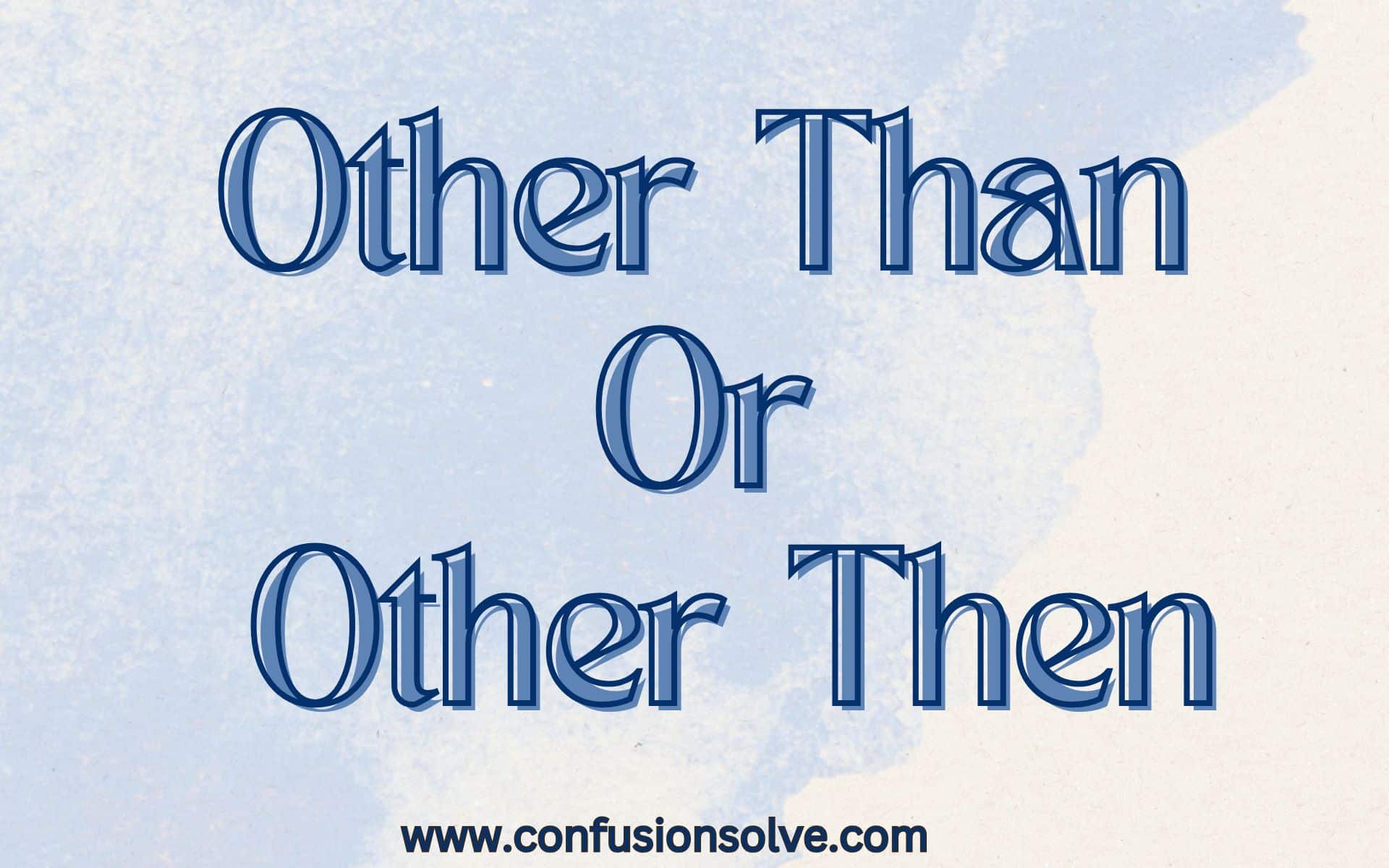Ever found yourself pausing mid-sentence, unsure whether to write “other than” or “other then”? You’re not alone.
This tiny mix-up is one of the most common English writing mistakes, but it can make a big difference in how your message comes across.
“Other than” is the correct phrase, used to exclude or highlight exceptions, like saying, “I don’t eat anything other than pizza.”
On the flip side, “other then” is always incorrect because “then” refers to time, not exclusion. Whether you’re drafting an email, writing an essay, or texting a friend, knowing the difference can boost your writing clarity and precision. Let’s dive in and clear up the confusion once and for all!
Understanding the Difference Between “Other Than” and “Other Then”
The difference between other than and other then is all about meaning. “Other than” means “except for” or “apart from.” For example, “I don’t eat anything other than pizza.” Here, pizza is the only thing you eat. On the other hand, “other then” is incorrect because “then” refers to time, not exclusion. For instance, “We went to the park, then we had ice cream.” Mixing these up can make your writing confusing.
Think of “other than” as a filter. It helps you exclude everything except what you specify. For example, “Other than the noise, the apartment is perfect.” Here, the noise is the only problem. Using “other then” in this context would be wrong because “then” doesn’t fit the meaning. Always remember: “other than” for exclusion, “then” for time.
Why “Other Than” is the Correct Phrase in English Grammar
“Other than” is a preposition that shows exclusion. It’s used to highlight exceptions or differences. For example, “She has no hobbies other than painting.” This means painting is her only hobby. The phrase is essential for clear and precise communication, especially in formal writing tips and professional communication.
Using “other than” correctly can make your writing sound polished. For instance, “Other than the delay, the project was successful.” Here, the delay is the only issue. On the other hand, “other then” is grammatically incorrect because “then” refers to time, not exclusion. For example, “We ate dinner, then we watched a movie.” Always use “other than” when you want to exclude something.
You may also like:Shiny vs Shiney – Which Form is Correct?
Common Mistakes: Using “Other Then” Instead of “Other Than”
One of the most common grammar errors to avoid is using “other then” instead of “other than”. This mistake happens because “than” and “then” are homophones in English—they sound alike but have different meanings. For example, “I like everything other then the movie” is incorrect. The right phrase is “I like everything other than the movie.”
To avoid this error, remember that “than” is for comparisons or exclusions, while “then” is for time. For example, “She is taller than her brother” (comparison) vs. “We went to the store, then we went home” (time). Mixing these up can make your writing sound unprofessional. Always double-check your sentences to ensure you’re using the correct word.
How to Use “Other Than” Correctly in Sentences
Using “other than” is simple if you follow these steps. First, identify what you want to exclude. For example, “I don’t know anyone other than Sarah at the party.” Here, Sarah is the exception. Second, place “other than before the exception. For instance, “Other than the price, the car is perfect.”
You can also use “other than” in comparisons. For example, “Other than her laugh, she’s just like her sister.” Here, the laugh is the only difference. By practicing these steps, you’ll master the grammar rules for than and then and improve your writing clarity and precision.
Examples of Correct Usage with “Other Than”
Here are some examples of other than in different contexts:
- “Other than rain, the weather was perfect.”
- “She has no hobbies other than painting.”
- “Other than a few typos, the essay was excellent.”
- “I don’t trust anyone other than you.”
- “Other than the noise, the apartment is great.”
These examples show how “other than” is used to exclude or highlight exceptions. By using it correctly, you can make your writing clearer and more professional.
The Meaning of “Other Than” and Its Role in Exclusion
The other than meaning is simple: it means “except for” or “apart from.” It’s used to exclude something from a group or category. For example, “Other than the budget, the project is on track.” Here, the budget is the only issue.
This phrase is also used in comparative phrases. For instance, “Other than her height, she’s just like her mother.” Here, the height is the only difference. By understanding the role of “other than” in exclusion, you can use it effectively in your writing.
Why “Other Then” is Grammatically Incorrect
“Other then” is incorrect because “then” refers to time or sequence, not exclusion. For example, “We ate dinner, then we watched a movie.” Using “then” in place of “than” creates confusion. For instance, “I like everything other then the movie” is wrong. The correct phrase is “I like everything other than the movie.”
To avoid this mistake, remember that “than” is for comparisons or exclusions, while “then” is for time. For example, “She is taller than her brother” (comparison) vs. “We went to the store, then we went home” (time). Always use “other than” when you want to exclude something.
Than vs. Then: Key Differences and When to Use Each
The difference between than and then is crucial for clear writing. “Than” is used for comparisons, like “She is taller than her brother.” “Then” is used for time or sequence, like “We ate dinner, then we watched a movie.”
Here’s a quick guide:
- Use “than” for comparisons: “He is smarter than me.”
- Use “then” for time: “We went to the park, then we had ice cream.”
By mastering these grammar rules for than and then, you can avoid common mistakes and improve your writing.
Pronunciation Guide: How to Say “Other Than” Correctly
Pronouncing “other than” correctly is easy. Say “UH-ther THAN.” Stress the “than” to make it clear. For example, “I don’t eat anything other than pizza.” Avoid saying “other then,” which sounds like “UH-ther THEN.”
Here’s a tip: Practice saying “other than” out loud. For example, “Other than the noise, the apartment is perfect.” This will help you remember the correct pronunciation and usage.
Synonyms for “Other Than” to Enhance Your Writing
If you want to vary your writing, try these synonyms for other than:
- Except for
- Besides
- Apart from
For example:
- “I like all fruits except for bananas.”
- “Besides the price, the car is perfect.”
Using synonyms can make your writing more engaging and avoid repetition.
Everyday Usage of “Other Than” in Conversations and Writing
“Other than” is common in everyday English. For example:
- “Other than work, I have no plans this weekend.”
- “Other than that, everything is fine.”
These examples show how “other than” is used to exclude or highlight exceptions in daily conversations and writing.
You may also like:Momma or Mama: Which One is Correct? A Complete Guide
How to Avoid Common Grammar Errors with “Other Than”
To avoid grammar errors to avoid, remember these tips:
- Use “than” for comparisons or exclusions.
- Use “then” only for time or sequence.
For example, “I don’t trust anyone other than you.” Here, “than” is correct because it shows exclusion. By following these tips, you can avoid common mistakes and improve your writing.
The Role of “Other Than” in Comparisons and Exceptions
“Other than” is often used in comparative phrases. For example, “Other than her laugh, she’s just like her sister.” Here, the laugh is the only difference. This phrase helps you highlight exceptions or differences in a clear and concise way.
Breaking Down the Definitions of “Other” and “Than”
Let’s break down the words:
- “Other” means different or additional.
- “Than” is used for comparisons.
Together, “other than” means “except for” or “apart from.” For example, “Other than the budget, the project is on track.” Here, the budget is the only issue.
Sample Sentences Using “Other Than” in Context
Here are some sentence examples with other than:
- “Other than the noise, the apartment is great.”
- “He has no interests other than gaming.”
- “Other than the delay, the report was flawless.”
These examples show how “other than” is used to exclude or highlight exceptions.
Formal vs. Informal Writing: Using “Other Than” Effectively
“Other than” works in both formal and informal contexts. For example:
- Formal: “Other than the budget, the project is on track.”
- Informal: “Other than that, I’m good!”
By using it correctly, you can improve your writing clarity and precision.
You may also like:Forrest or Forest – What’s the Difference?
Homophones in English: Than vs. Then Explained
“Than” and “then” are homophones in English—they sound alike but have different meanings. “Than” is for comparisons, while “then” is for time. For example:
- “She is taller than her brother.”
- “We ate dinner, then we watched a movie.”
Understanding this difference is key to avoiding mistakes.
How to Improve Your Writing with Proper Grammar Rules
To improve your writing, follow these grammar rules for than and then:
- Use “than” for comparisons.
- Use “then” for time.
For example, “He is smarter than me” (comparison) vs. “We went to the store, then we went home” (time). By mastering these rules, you can avoid errors and write clearly.
The Importance of Precision in Professional Communication
In professional communication, every word matters. Using “other than” correctly shows attention to detail and boosts your credibility. For example, saying “Other than the delay, the project was flawless” highlights your ability to pinpoint exceptions clearly.
Mistakes like using “other then” instead of “other than” can make your writing seem careless. Precision ensures your message is understood exactly as intended, whether you’re writing emails, reports, or presentations. Clear, accurate communication builds trust and reflects professionalism. Always double-check your work to avoid errors and maintain clarity.
You may also like:Onsite or On-Site: Which One Should You Use?
Final Thoughts: Mastering “Other Than” for Clearer Writing
In conclusion, “other than” is the correct phrase for exclusion, while “other then” is always incorrect. By understanding the difference between other than and other then, practicing with examples, and avoiding common mistakes, you can improve your writing. Start using “other than” correctly today and watch your writing become clearer and more professional!
Conclusion:
Using “other than” correctly is a small change that makes a big difference. It helps you exclude or highlight exceptions clearly, like saying, “I don’t eat anything other than pizza.” On the other hand, “other then” is always incorrect because “then” refers to time, not exclusion.
By understanding the difference between other than and other then, you can avoid common mistakes and improve your writing. Start practicing today, and you’ll see how this simple phrase can make your communication clearer and more professional. Keep writing, and keep improving!
Meta Description:
Learn why “other than” is correct, how to use it properly, and avoid common grammar mistakes. Write clearly and confidently!
FAQs
- Is other than or other then correct?
“Other than” is correct; it means “except for.” “Other then” is incorrect because “then” refers to time. - Which is correct, than or then?
Use “than” for comparisons (e.g., “better than”) and “then” for time (e.g., “we ate, then left”). - When to use other than?
Use “other than” to exclude or highlight exceptions, like “I eat nothing other than pizza.” - Is it none other than or then?
It’s “none other than,” as in “It was none other than John who helped.” “Then” is incorrect here.








